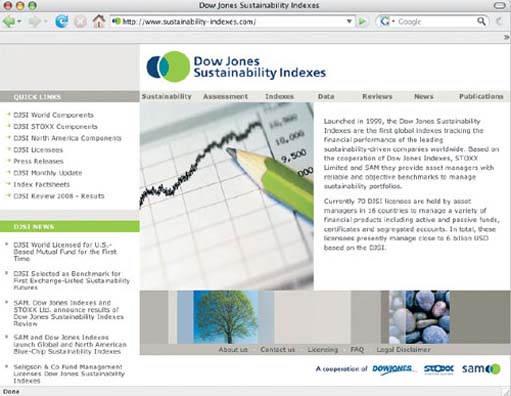4.2.3 Business needs sustainability
The second argument is more profound: long-term profitability, and the existence of business itself, is threatened if companies can't transform themselves. This assumes that although the costs of environmental and social impacts can be ignored for a period, in the context of globalisation of environmental, social and political processes, they will come back to haunt businesses, and ultimately threaten their survival. There are several communications and management tools that have been developed to help get business decision makers into an ecological mindset.
The success of a business is generally measured in reports of financial performance. This information is enormously influential in shaping a company's future, whether it relates to its capacity to expand or the likelihood of merger or takeover. However, financial results are increasingly recognised to be only part of the story: businesses that don't put in place means of measuring and benchmarking (i.e. comparing performance against that of other companies) environmental and social performance are at risk. NGOs might destroy a carefully nurtured brand name in the wake of exposure of an environmental or a social ‘crime’. Alternatively, the fast-growing movement for socially responsible investment may begin asking awkward questions, damaging investment potential. Pressure from NGOs, the persistence of corporate accountability scandals and, more positively, some fresh thinking from leading figures within the business world, have resulted in widespread innovations in reporting.
The Web is an excellent source of both individual company reports (variously called environmental, sustainability or corporate social reports) and comparative indices that aim to tell the story of all three dimensions of sustainability – social, environmental and economic. Companies such as Shell and BP, with a track record in the 1990s of damaging public conflicts with NGOs, have been among the leaders of innovation in sustainability reporting, and the Web is often the best way to access the information, and to interact with the companies about it (Figure 13). Openness, both within and outside companies, has become a central claim of business reporting in these areas.

The Dow Jones Sustainability Indexes give comparative evidence about corporate performance, measured according to easily accessible sustainability criteria such as the nature of corporate governance, measurements of environmental performance and the quality of engagement with external stakeholders. However, many environmentalists argue that business performance on social and environmental issues is starting from such a pitifully low baseline that such information exercises are of little value unless they are contributing to a dramatic rethinking of what core business practice amounts to. They insist that relying on business voluntarism may result in one or two heart-warming stories, but will still leave most locked in the old way of doing things. Groups of independent-minded radicals have not waited for business or government action, but instead sought over the last three decades to blaze their own trail.
